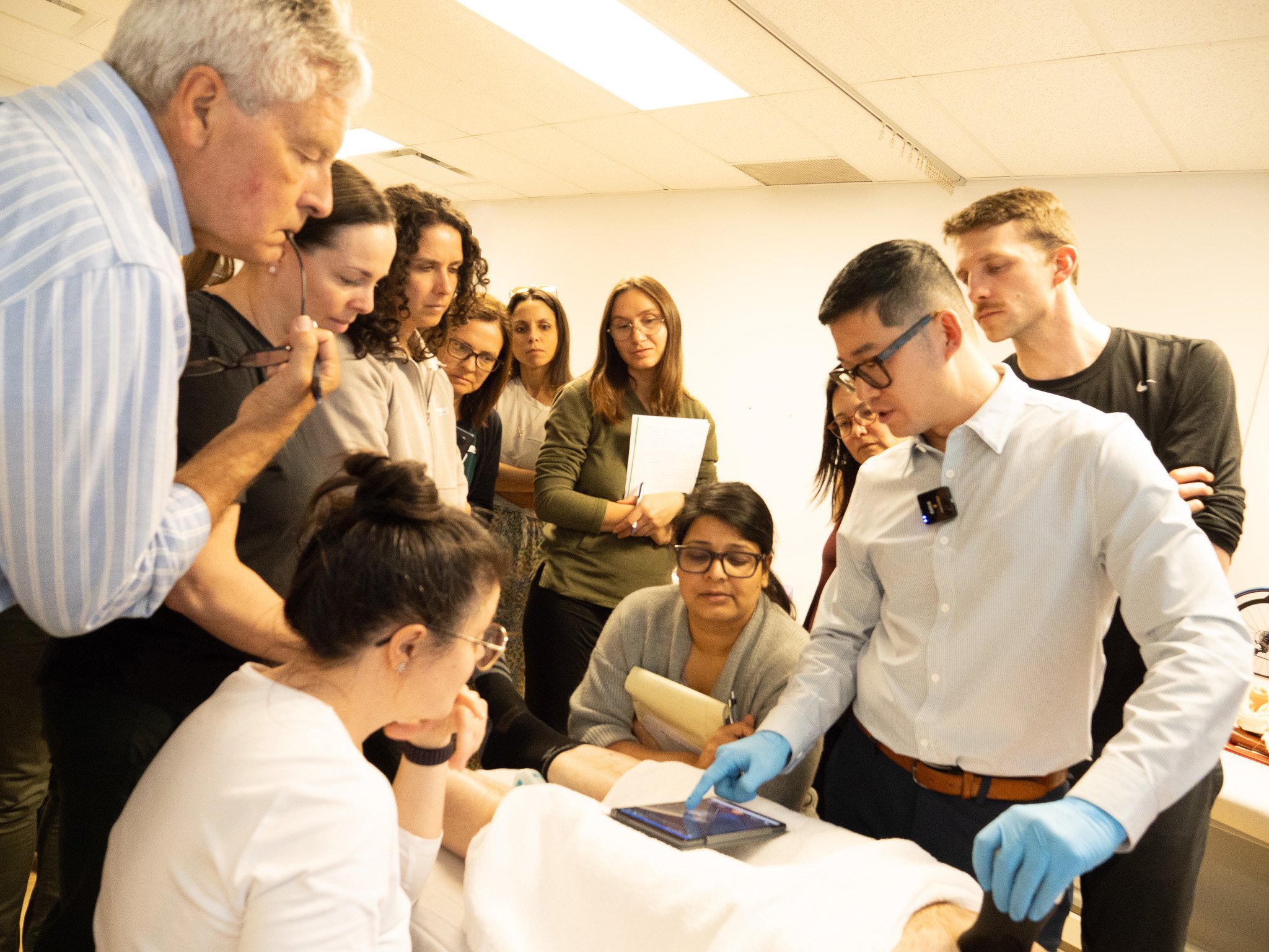
The Wizard of LUTS
When “just do kegels” isn’t cutting it anymore.
Treat bladder dysfunction, post-op incontinence, and male urgency with clinical clarity, not guesswork.
You might already treat these cases, but results can be hit or miss.
Dr. Whitney Rogers, PT, DPT
15+years of experience in pelvic health, Rehabilitation Service Supervisor at Kaiser Permanente
“This course was immediately applicable day one. The systematic way of evaluation helped me bucket symptoms so I can target my treatment and focus on what is most important. It felt based in science, not somebody’s clinical opinion. I am going into clinic tomorrow knowing I can apply what I learned.”
You’ll Walk Away Ready to Treat...
This masterclass on lower urinary tract symptoms and benign prostatic hyperplasia gives you a clear, structured approach to confidently treat the male clients you already see. That includes the men who still leak, hesitate, or wake up every hour — even when they’re doing everything “right.”
The IPC framework for treating LUTS & BPH
✅ Post-prostatectomy incontinence
✅ Bladder urgency and frequency
✅ Voiding dysfunction and retention
✅ Complex or mixed LUTS presentations
✅ Benign Prostatic Hyperplasia (BPH)
✅ Neurogenic bladder symptoms
✅ Prostate cancer patients (pre and post-op)
But more importantly, you'll learn how to:
🔹 Recognize when pelvic floor strengthening helps and when it makes symptoms worse
🔹 Use spine-based testing to reduce urgency and hesitancy
🔹 Assess and influence bladder pressure through posture and breath control
🔹 Move beyond "tight vs. weak" thinking and target the true mechanical contributors to LUTS
Charlotte Lapeyre, pelvic physical therapist
As pelvic floor therapists, we’re trained to focus on the pelvic floor. But this course completely changed my perspective. I learned how to treat bladder dysfunction by addressing posture, breathing, and pressure — not just doing Kegels.
Follow the Yellow Brick Road to 20 CEUs
Approved by the California (#25-211) and Illinois PT (#977-9668) Associations . Real cases, real tools, and yes — it’s actually fun to take.
Not in CA or IL? Many states accept CEUs through reciprocity or self-submission. Check with your licensing board to confirm.
This course content is not intended for use by any participants outside the scope of their license or regulation.

What Makes This Course Different?
Not just more pelvic floor exercises and protocols. A full-body upgrade to how you assess and treat male urinary dysfunction.
✅ A clear framework (4MZ) to organize symptoms and drivers
✅ Tools to assess bladder pressure, posture, and breath
✅ Video flow and pee charts to guide your reasoning
✅ Practice with real male models (no awkward peer work)
✅ Know when kegels help — and when they don’t
Use the tools your male patients wish you already had.
With prostate surgeries rising and success rates as low as 17%, it’s time to go beyond the pelvic floor.
Practical Tools You Won’t Find Anywhere Else
Built inside the IPC LUTS Framework, these tools help you see, analyze, and treat male urinary symptoms with clarity.
IPC Flow Video Analysis
Spot voiding dysfunction by observing posture, timing, and effort in real time. Supports zone-based reasoning.
IPC Pee Charts
Structured transcriptions of your flow video. Reveal patterns, guide treatment, and improve patient understanding.
IPC Cup Test
Assess bladder capacity and pressure control during real-world tasks. Simple to apply and powerful for patient education.
These tools are unique to IPC. They help you see what’s really driving your patient’s symptoms — and give you a way to explain it clearly, treat it confidently, and bring your patients with you.
Marie-Christine Trahan, pelvic physiotherapist 14+ years of experience
My favourite tool is the IPC cup test. I’m going to use this right away with my patients starting Monday. I already ordered the cups!
As recognized by
The content shared in the Wizard of LUTS masterclass earns positive recognition from leading urologists at institutions including BPH Canada.
Master Urodynamics & Ultrasound
Elevate your clinical insight with tools specialists already use.
🟢 Learn how to interpret urodynamics reports when they land on your desk and use them to guide your clinical reasoning
🟢 Use bladder ultrasound to confirm your findings and coach patients
🟢 Bridge the gap with urologists by speaking their language with clarity
Build Real Confidence With Real Male Anatomy
No internal peer exams. No pretending your lab partner is a male patient. Just real male models and real anatomy — so you're ready for real clinical work.
The Wizard of LUTS outline.
A male lower urinary tract symptoms and benign prostatic hyperplasia masterclass. Online pre-course (4h) + live course (16h)
Day 1: 8:00am-5:30pm
Chapter 1 : Follow the Yellow Brick Road
Master sex-specific anatomy and pressure dynamics
Apply ICS classifications to real clinical cases
Learn a framework to organize complex LUTS patterns
Chapter 2: Dorothy’s Diary
Extract patterns from bladder diaries and FVCs
Build a functional LUTS profile with real metrics
Use validated symptom scores that actually guide care
Chapter 3: The Wizard’s Reveal
Interpret lab values and urodynamic reports
Visualize function with ultrasound in real time
Capture key behaviors with video flow analysis and the Pee Chart
Chapter 4: The Four Companions
Learn the Four Mechanical Zones: spine, abdomen, pelvic floor, bladder
Connect zone dysfunctions to urgency, leakage, and retention
Apply zone-based sequencing to target treatment
Chapter 5: The Oz Lab
Practice live assessment with male models
Apply spinal testing, CLAPS breathing, and pressure mapping
Learn the IPC Cup Test and functional ultrasound hands-on
Day 2: 8:00am-5:30pm
Chapter 6: The Good Witch Glinda
Understand trauma, tone, and nervous system regulation
Use behavior change and trauma-informed care strategies
Screen with the HAPPIMALE psychosocial tool
Chapter 7: The Wicked
Recognize neurologic patterns behind LUTS
Learn about meds, PTNS, and how they impact outcomes
Understand when symptoms suggest deeper neural involvement
Chapter 8: The Cowardly Lion’s Trial
Treat post-prostatectomy incontinence with clarity
Use the IPC Cup Test to assess functional leakage
Combine fluid, pelvic floor, and zone strategies with confidence
Chapter 9: Flying Monkey Attacks
Break down urgency, frequency, and OAB
Use diary analytics and flow data to spot hidden patterns
Guide urgency treatment beyond just bladder drills
Chapter 10: The Doors to the Emerald City
Decode voiding dysfunction: UAB, BOO, DSD, and more
Learn flow-based reasoning for younger and older men
Apply zone-based rehab for emptying issues
Chapter 11: Save Toto
Understand BPH surgeries and recovery expectations
• Learn the ProCARE framework for post-op rehab
Collaborate confidently with urologists and support long-term outcomes
Vishwa Buch, pelvic physical therapist
“I used to think there were just two types of incontinence. Now I know there are five — and how to treat each of them without just doing Kegels all the time. This course gave me tools I can actually use to figure out where symptoms are coming from and what to do about them.”
Your co-instructors.
Steven Tijerina
PT, DPT, Cert. MDT
Dr. Steven Tijerina, PT, DPT, Cert. MDT, is a passionate advocate for male pelvic health, serving as the US Director of US Operations at Integrative Pelvic Care (IPC). With a focus on education and empowerment, Dr. Tijerina plays a pivotal role in bridging the gap in male pelvic care through innovative training and mentorship.
In addition to his leadership at IPC, Dr. Tijerina is the clinic director of an orthopedic clinic, where he works with a diverse range of patients. He specializes in male pelvic rehabilitation, assisting men with pelvic pain, post-surgical care, and urinary and bowel dysfunction.
As a member of IPC’s course development team, Dr. Tijerina collaborates with our expert instructors to design practical and creative courses that equip physical therapists with the skills and confidence needed to treat male pelvic pain effectively. He is currently developing upcoming courses specifically tailored to help new clinicians transition into male pelvic care, addressing common barriers and building confidence in working with this patient population.
Dr. Tijerina is also a dedicated moderator on the Pelvic Tribe, an active community for pelvic health professionals. Through this platform, he coaches therapists on overcoming clinical challenges, moderates discussions on complex cases, and hosts weekly coaching calls covering patient communication, treatment strategies, and more.
Drawing on his extensive experience and commitment to advancing male pelvic rehabilitation, Dr. Tijerina’s goal is to help connect therapists nationwide to further male pelvic care.
Your co-instructors.
Di (Woody) Wu
M.Sc PT, MMed, MBBS, Cert. MDT
Di Wu trained as a medical doctor and completed his residency in Beijing. He practiced as an Orthopedic Surgeon for several years, before establishing himself in Montreal, Canada. In Montreal, he attended physical therapy school at McGill university where he was the first man to enrol in the pelvic floor course. He adapted his learning from that course, which solely focused on women, to be able to effectively treat men.
Over the past decade, drawing inspiration from his background as a doctor and as a PT, he has built a framework to help him get repeatable and reliable treatment results for treating male pelvic pain. After almost a decade of refinement and conducting studies to corroborate the findings, Di has solidified the framework. He now shares his knowledge and passion about male pelvic pain nationally and internationally with PTs who are interested in treating male pelvic pain.
Frequently asked questions
-
All courses have been built to bring you maximal value and to give you the tried and tested assessments and treatments that yield results in-clinic. We’ve taken theoretical courses before and it was hard to figure out how to apply what was learned in practice, so we understand where you’re coming from. Rest assured, we have packed the courses with applicable techniques and treatments. The best part is that IPC is built on the latest evidence as we do research with academic partners once patterns are discovered in-clinic.
-
No, men and women differ a lot when it comes to pelvic issues. While we believe that there is knowledge that is common and useful for treating both men and women, we believe that it’s like learning how to play violin versus how to play piano.
There are commonalities such as how to read music sheet, there are many fundamental differences between playing both instrument. At IPC we pride ourselves in providing the most comprehensive courses so you can successfully treat men even you haven’t had any experience before.
-
Yes, upon successful completion of a course, you will receive a certification acknowledging your achievement.
-
Our Wizard of LUTS Courses and Four Horsemen of Male Pelvic Pain Courses are CEU approved in several States. Our main CEU application is submitted to the physical therapy board of some States. These States may vary year by year so please refer to the sign-up page of the course to validate that your State is listed. Many States offer reciprocal acceptance of CEUs as long as the course is approved by a State.
If your State is not listed, we’re happy to provide you with the necessary information if you wish to apply for CEUs as an individual applicant.
For online courses, we’re not applying for continuing education units under any States. We’re happy to provide you with the necessary information if you wish to submit a CEU application as an individual applicant. -
We have three flagship courses. One that is focused on treating pain: The Four Horsemen of Male Pelvic Pain. One that is focused on treating LUTS: The Wizard of LUTS. And the other one is focused on treating erectile dysfunction: “Rhythms of ED”.
Our courses are Masterclasses that provide you with all the necessary information and practical tools to succeed in helping your patients who are suffering from pelvic pain or erectile dysfunction.
As we share in our courses, treating pain is drastically different from treating erectile dysfunction, therefore which course you wish to start with will depend on your interest and goals as a clinician.
-
Currently our flagship Four Horsemen of Male Pelvic Pain is an in-person course with some online pre-work to be done prior to attending the course. Same thing for our Wizard of LUTS.
Our ED courses are fully online and self-paced.
-
We welcome any health professionals has male pelvic health within their scope of practice. As always, it is the responsibility of a course participant to guarantee that they are legally able to conduct the techniques taught in an IPC course prior to participating.
IPC courses are mostly attended by physical therapists. We have had physical therapist assistants, occupational therapists, physicians (urologist), nurses, chiropractors attend our courses.
-
If you signed up for the course recently and there's more than 30 days until the start date, you have the flexibility to cancel your registration. A 10% administrative fee will apply for the refund option, or you can switch to another course with no extra charge.
If the course is just around the corner (less than 30 days away), a refund is no longer an option. However, you still have the freedom to seamlessly transfer to another course or convert your registration fees into credit for a future course, all without incurring any additional charges.





























